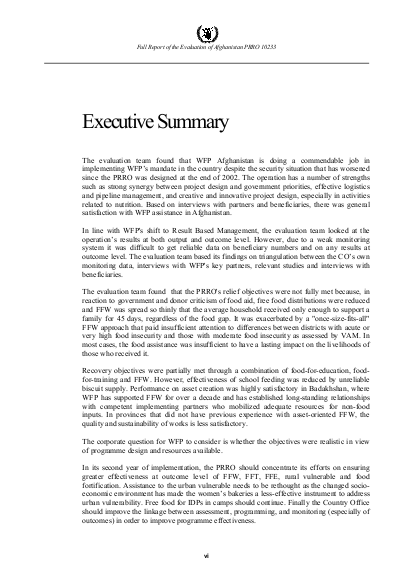
Objectives: To render accountability to the Executive Board and to enable WFP to learn from experience at CO, RB and corporate level to improve WFP operations.
The evaluation team found that WFP Afghanistan is doing a commendable job in implementing WFP’s mandate in the country despite the security situation that has worsened since the PRRO was designed at the end of 2002. The operation has a number of strengths such as strong synergy between project design and government priorities, effective logistics and pipeline management, and creative and innovative project design, especially in activities related to nutrition. Based on interviews with partners and beneficiaries, there was general satisfaction with WFP assistance in Afghanistan. In line with WFP's shift to Result Based Management, the evaluation team looked at the operation’s results at both output and outcome level. However, due to a weak monitoring system it was difficult to get reliable data on beneficiary numbers and on any results at outcome level. The evaluation team based its findings on triangulation between the CO’s own monitoring data, interviews with WFP's key partners, relevant studies and interviews with beneficiaries. The evaluation team found that the PRRO's relief objectives were not fully met because, in reaction to government and donor criticism of food aid, free food distributions were reduced and FFW was spread so thinly that the average household received only enough to support a family for 45 days, regardless of the food gap. It was exacerbated by a "once-size-fits-all" FFW approach that paid insufficient attention to differences between districts with acute or very high food insecurity and those with moderate food insecurity as assessed by VAM. In most cases, the food assistance was insufficient to have a lasting impact on the livelihoods of those who received it. Recovery objectives were partially met through a combination of food-for-education, foodfor-training and FFW. However, effectiveness of school feeding was reduced by unreliable biscuit supply. Performance on asset creation was highly satisfactory in Badakhshan, where WFP has supported FFW for over a decade and has established long-standing relationships with competent implementing partners who mobilized adequate resources for non-food inputs. In provinces that did not have previous experience with asset-oriented FFW, the quality and sustainability of works is less satisfactory. The corporate question for WFP to consider is whether the objectives were realistic in view of programme design and resources available.
n its second year of implementation, the PRRO should concentrate its efforts on ensuring greater effectiveness at outcome level of FFW, FFT, FFE, rural vulnerable and food fortification. Assistance to the urban vulnerable needs to be rethought as the changed socioeconomic environment has made the women’s bakeries a less-effective instrument to address urban vulnerability. Free food for IDPs in camps should continue. Finally the Country Office should improve the linkage between assessment, programming, and monitoring (especially of outcomes) in order to improve programme effectiveness.